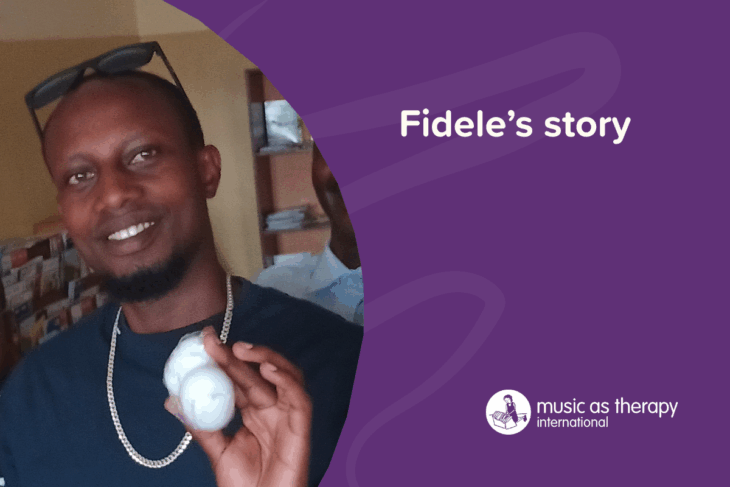Fidèle’s Story
Rwanda
- Caregivers
- Children
- Disability

(Soma iyi nkuru muri Kinyarwanda.)
With more than two decades’ experience, Fidèle Nshimiye has an invaluable perspective on the challenges and rewards of using music in care. As one of the founders of Youth Led Musical Therapy, he is also perfectly placed to share his hopes for what the future could hold for caregivers and people in vulnerable situations in Rwanda.
You’ve been using music for a long time, can you share a bit about your current practice, and anything about it that continues to inspire you?
I have been using music every day in a centre for children with disabilities, with 100 beneficiaries. Every day I create new things based on the people I work with.
When I am going through a difficult time, the thing that keeps me going is the connection with others, and I see the benefits it brings to my beneficiaries’ daily lives.
Are there any particular examples you’d like to share?
What motivates me is seeing my beneficiaries overcome their loneliness; when I was teaching young people living with HIV/AIDS, I was impressed by how they overcome their grief.
What really excites me is the development in the minds of my beneficiaries. It also gives me peace of mind.
No journey is without its challenges. Are there any that stand out for you, and how did you overcome them?
The challenges I faced were working with a child with autism on their own. But I was given ideas by the Music as Therapy International team that came to Rwanda from the UK.
And what role has the long-term working relationship with Music as Therapy International played in your practice?
The first is the training they have given us, and it has also helped us meet different people, as well as the financial support that has helped us build capacity. We can learn from what others have already achieved.
In recent years you helped create Youth Led Musical Therapy, a new association. What was the motivation and vision behind setting up this organisation?
Building a strong association that helps many people. It has allowed us to expand, so that we have the right to reach more beneficiaries, as well as to promote music. By educating the leadership, we can work with institutions that care for these categories of people.
